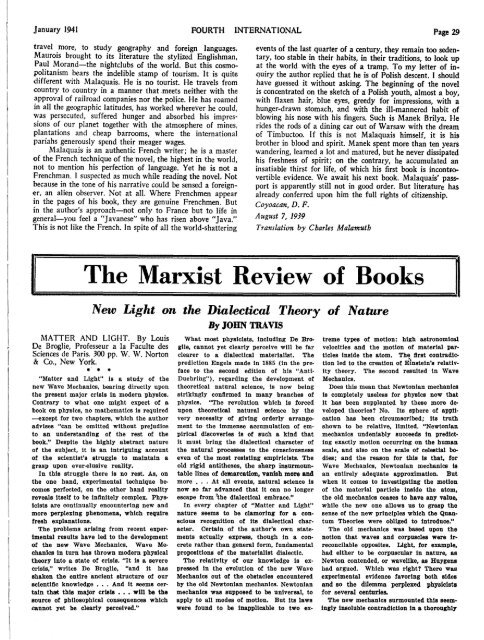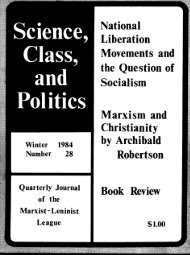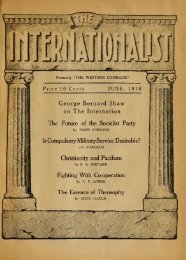January 1941 - Marxists Internet Archive
January 1941 - Marxists Internet Archive
January 1941 - Marxists Internet Archive
You also want an ePaper? Increase the reach of your titles
YUMPU automatically turns print PDFs into web optimized ePapers that Google loves.
<strong>January</strong> <strong>1941</strong> FOURTH INTERNATIONAL Page 29<br />
travel more, to study geography and foreign languages.<br />
Maurois brought to its literature the stylized Englishman,<br />
Paul Morand-the nightclubs of the world. But this cosmopolitanism<br />
bears the indelible stamp of tourism. It is quite<br />
different with Malaquais. He is no tourist. He travels from<br />
country to country in a manner that ,meets neither with the<br />
approval of railroad companies nor the police. He has roamed<br />
in all the geographic latitudes, has worked wherever he could,<br />
was persecuted, suffered hunger and absorbed his impressions<br />
of our planet together with the atmosphere of mines,<br />
plantations and cheap barrooms, where the international<br />
pariahs generously spend their meager wages.<br />
Malaquais is an authentic French writer; he is a master<br />
of the French technique of the -novel, the highest in the world,<br />
not to mention his perfection of language. Yet he is not a<br />
Frenchman. I suspected as much while reading the novel. Not<br />
because in the tone of his narrative could be sensed a foreigner,<br />
an alien observer. Not at all. Where Frenchmen appear<br />
in the pages of his book, they are genuine Frenchmen. But<br />
in the author's approach-not only to France but to life in<br />
general-you feel a "Javanese" who has risen above "Java."<br />
This is not like the French. In spite of all the world-shattering<br />
events of the last quarter of a century, they remain too sedentary,<br />
too stable in their habits, in their traditions, to look up<br />
at the world with the eyes of a tramp. To my letter of inquiry<br />
the author replied that he is of Polish descent. I should<br />
have guessed it without asking. The beginning of the novel<br />
is concentrated on the sketch of a Polish youth, almost a boy,<br />
with flaxen hair, blue eyes, greedy for impressions, with a<br />
hunger-drawn stomach, and with the ill-mannered habit of<br />
blowing his nose with his fingers. Such is Manek Brilya. He<br />
rides the rods of a dining car out of Warsaw with the dream<br />
of Timbuctoo. If this is not Ivlalaquais himself, it is his<br />
brother in blood and spirit. Manek spent more than ten years<br />
wandering, learned a lot and matured, but he never dissipated<br />
his freshness of spirit; on the contrarY,he accumulated an<br />
insatiable thirst for life, of which his first book is incontrovertible<br />
evidence. We await his next book. Malaquais' passport<br />
is apparently still not in good order. But literature has<br />
already conferred upon him the full rights of citizenship.<br />
Coyoacan, D. F.<br />
August 7, 1939<br />
Translation by Charles Malamuth<br />
~I<br />
t.:;;;;1 iiiiiiiiiiiiiiiiiiiiiiiiiiiTiiiiiiiiiiii' iiiiiiiiiiiihiiiiiiiiiiiieiiiiiiiiiiiiMiiiiiiiiiiiiiiiaiiiiiiii;iiiiriiiiiiii;iiiiXiiiiiiiiiiiiisiiiiiiiiiiiitiiiiiiii;iiiiRiiiiiiiiiiiiiiieiiiiiiiiiiiiViiiiiiiiiiiii eiiiiiiiiiiiiwiiiiiiiiiiiiiii°iiiiiiii;iiiifiiiiiiiiiiiiBiiiiiiiiiiiiiiiOiiiiiiiiiiiiOiiiiiiiiiiiikiiiiiiii;iiiiS<br />
New Light on the Dialectical Theory of Nature<br />
l\IATTER AND LIGHT. By Louis<br />
De Broglie, Professeur a la Faculte des<br />
Sciences de Paris. 300 pp. W. W. Norton<br />
& Co., New York.<br />
.' . .<br />
"Matter and Light" is a study of the<br />
new Wave Mechanics, bearing directly upon<br />
the present major crisis in modern physics.<br />
Contrary to what one might expect of a<br />
book on physics, no mathematics is required<br />
-except for two chapters, which the author<br />
advises "can be omitted without prejudice<br />
to an understanding of the rest of the<br />
book." Despite the highly abstract nature<br />
of the subject, it is an intrigUing account<br />
of the scientist's IiItruggle to maintain a<br />
grasp upon ever-elusive reality.<br />
In this struggle there Js no rest. As, on<br />
the one hand, experimental technique becomes<br />
perfected, on the other hand reality<br />
reveals itself to be infinitely complex. Physicists<br />
are continually encountering new and<br />
more perplexing phenomena, which require<br />
fresh explanations.<br />
The problems arising from recent experimental<br />
results have led to the development<br />
of the new Wave Mechanics. Wave Mechanics<br />
in turn h~s thrown modern physical<br />
theory into a state of crisis. "It is a severe<br />
crisis," writes De Broglie, "and it has<br />
shaken the entire ancient structure of our<br />
scientific knowledge . . . And it seems certain<br />
that this major crisis • • • will be the<br />
source of philosophical consequences which<br />
cannot yet be clearly perceived."<br />
By JOHN TIL\. VIS<br />
What most physicists, including De Broglie,<br />
cannot yet clearly perceive will be far<br />
clearer to a dialectical materialist. The<br />
prediction Engels made in 1885 (in the preface<br />
to the second edition of his "Anti<br />
Duehriilg"), regarding the development of<br />
theoretical natural science, is now being<br />
strikingly confirmed in many branches of<br />
physics. "The revolution which is forced<br />
upon theoretical natural science by the'<br />
very necessity of giving orderly arrangement<br />
to the immense accumulation of empirical<br />
discoveries is of such a kind that<br />
it must bring the dialectical character of<br />
the natural processes to the consciousness<br />
even of the most resisting empiricists. The<br />
old rigid antitheses, the sharp insurmountable<br />
lines of demarcation, vanish more and<br />
more . . . At all events, natural science is<br />
now so far advanced that it can no longer<br />
escape from 'the dialectical embrace."<br />
In every chapter of "Matter and Light"<br />
nature seems to be clamoring for a conscious<br />
recognition of its dialectical character.<br />
Certain of the author's own statements<br />
actually express, though in a concrete<br />
rather than general form, fundamental<br />
propositions of. the materialist dialectic.<br />
The relativity of our knowledge is expressed<br />
in the evolution of the new Wave<br />
Mechanics out of the obstacles encountered<br />
by the old Newtonian mechanics. Newtonian<br />
mechanics was supposed to be universal, to<br />
apply to all modes of motion. But its laws<br />
were found to ,be inapplicable to two extreme<br />
types of motion: high astronomical<br />
velocities and the motion of material particles<br />
inside the atom. The first contradiction<br />
led to the creation of E1nstein'8 relativity<br />
theory. The second resulted in Wave<br />
Mechanics.<br />
Does this mean that Newtonian mechanics<br />
is completely useless for physics now that<br />
it has been supplanted by these more developed<br />
theories? No. Its sphere of appIlcation<br />
has been circumscribed; its truth<br />
shown to be relative, limited. "Newtonian<br />
mechanics undeniably su~eeds in predicting<br />
exactly motion occurring on the human<br />
scale, and also on the scale of celestial bodies;<br />
and the reason for this is that, for<br />
Wave Mechanics, Newtonian mechanics is<br />
an entirely adequate approximation. But<br />
when it comes to investigating the motion<br />
of the material particle inside the atom,<br />
the old mechanics ceases to have any value.<br />
while the new one allows us to grasp the<br />
sense of the new principles which the Quantum<br />
Theories were obliged to introduce."<br />
The old mechanics was based upon the<br />
notion that waves and corpuscles were irreconcilable<br />
opposites. Light, for example,<br />
had either to be corpuscular in nature, as<br />
Newton contended, or wavelike, as Huygens<br />
had argued. Which was right? There was<br />
experimental evidence favoring both sides<br />
and so the dilemma perplexed physieists<br />
for several centuries.<br />
The new mechanics surmounted this seemingly<br />
insoluble contradiction In a thoroughly
















